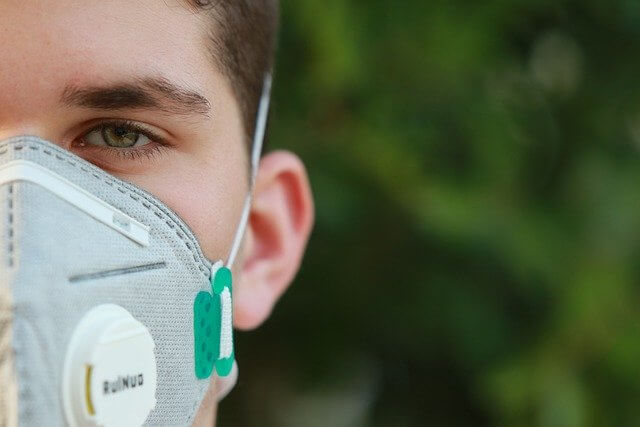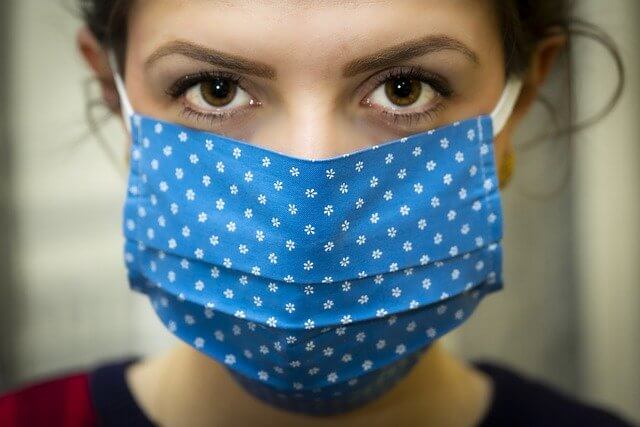At this juncture during the Covid-19 era, face masks have increasingly become a common feature of everyone’s daily lives.
Among other measures suggested to fight the spread of the novel coronavirus such as social distancing and maintaining good hand hygiene, both the Centers for Disease Control (CDC) and the World Health Organization (WHO) recommend that people use face coverings when in public.
With summer now turning into fall and coronavirus cases still cropping around Canada yet no plausible vaccine insight, it’s becoming increasingly clear that we will have to wear masks in public for the meantime.
But with the market flooded with all sorts of masks, how do we know what kinds are safe for mass use? The CDC and the WHO also recommends the use of cloth or fabric masks for the public and surgical masks for use in healthcare facilities as a form of PPE. Surgical masks are, however, available for public use as well.
Let’s take a deep look at both types of face masks, what sets them apart, and how reliable they are in regards to curbing the spread of Covid-19.
How Are Surgical Masks Made?
A single surgical mask consists of a multi-layered structure of textile and non-woven bonded fabric. Non-woven fabric can be made from polyester, polyethylene, polystyrene, and polycarbonate. However, polypropylene is the material used in the production of the non-woven fabric.
Non-woven fabric material that’s 20 grams per square meter in density is shaped in a complex web-like structure made of fibers smaller than a micron in diameter using melt-blown technology.
The non-woven fabric is placed on either end of the mask and provides good bacteria filtration and air permeability. Unlike woven cloth, non-woven fabric is not slippery. They are also cheaper and easy to make because of their disposable nature.
What Are Surgical Masks?

Surgical face masks, or medical masks, are disposable face coverings designed to go over the nasal bridge and around the chin.
These masks are meant to cover the nostrils and mouth from contact with droplets, particles, sprays, or splashes that may contain pathogens and harmful bacteria. They also help minimize how much exposure the wearer exposes saliva and respiratory secretions to other people.
Surgical masks vary in thickness which directly affects their capacity to protect the wearer from getting into contact with potentially harmful particles. However, the difference in thickness might affect the wearer’s breathing ability. It’s also worth pointing out that surgical masks should not be shared.
How Efficient Are Surgical Masks Against the Coronavirus?
As far as the coronavirus goes, a surgical mask serves two purposes. Firstly, it protects the wearer from getting infected through respiratory droplets or biological fluids released by a carrier through talking, coughing, or sneezing. When these droplets fall on the face of a non-infected person, they can transmit the virus through the mouth, nose, or eyes.
Secondly, when the wearer exhales, the mask traps droplets of oral secretions or saliva from contaminating public breathable air and the general environment. It’s for these purposes that surgical masks are widely preferred by dentists, nurses, and surgeons.
Surgical masks have, however, been on the receiving end of criticisms regarding their efficiency.
For instance, while a surgical mask may do a good job in blocking large particles, by design, it does not block tiny particles. Because they do not offer complete coverage from germs and other contaminants, the loose fit between the wearer’s face and the surface of the mask
Also, surgical masks cannot be used more than once. If the mask is soiled, damaged, or breathing with it on proves difficult, the owner of the mask should get rid of it in a way that will not compromise the health of others. To safely do so, place the surgical mask in a plastic bag, fold the bag, and throw it in the rubbish.
Remember to wash your hands after doing so and get a new and clean replacement.
What Are Cloth Masks?

A cloth face mask is a face covering made out of fabric material. The CDC and the WHO recommend the mass use of cloth masks if the world is going to achieve any progress in the fight against Covid-19 pandemic.
Cloth masks are highly preferred because they are eco-friendly as compared to other alternatives. Unlike medical masks or respirators, fabric masks can be worn multiple times because they can be washed for reuse.
They are also cheap and easy to make with a lot of people opting to make fabric masks from their homes. They can be made from common material such as tightly woven cotton used to make shirts or sheets.
Cloth masks are also a convenient alternative considering surgical masks and respirators are in short supply and the reserves are prioritized for healthcare workers to use as PPE. However, cloth masks are not regulated by health authorities. This means they are not subjected to the set filtration standards which may leave you vulnerable to infection.
When buying fabric masks, you need to consider the fabric. The thickness of the weave is important as it will be the ultimate decider on whether the mask will be efficient at filtration or not. You also need to get a mask with multiple layers as they are better at blocking tiny particles.
Another factor you need to look into is the shape of the mask. Its ability to filter out particles depends on how well it fits on your face. Lastly, make sure your cloth mask is always clean. If possible, wash it daily or at least once every two days using soap and warm water.
Prioritize Protection Over Personal Preference
With the use of face coverings described as a useful strategy of fighting the coronavirus, governments around the world have made it mandatory by law for people to wear face masks when in public.
The motivator behind such government approaches which most people would consider a bit egregious is the overwhelming scientific evidence supporting the notion that face mask use can help reduce the infection rates of the coronavirus.
Wrapping Up on Cloth Mask vs Surgical Mask
Another reason is that some people may be carriers of the virus and be asymptomatic. This means they can spread the virus to people without them knowing they are infected.
For these reasons, everyone must wear surgical and fabric masks to protect not only themselves but the people around them as well.

Stay Safe – Stay Healthy
You may also like to read more on Health and Wellness





1 Comment
James Mason
June 16, 2021 at 4:25 pmgeneralisert angstlidelse behandling
Takk for at du delte en så fantastisk blogg. Jeg synes det er veldig nyttig og lærer mye av det.